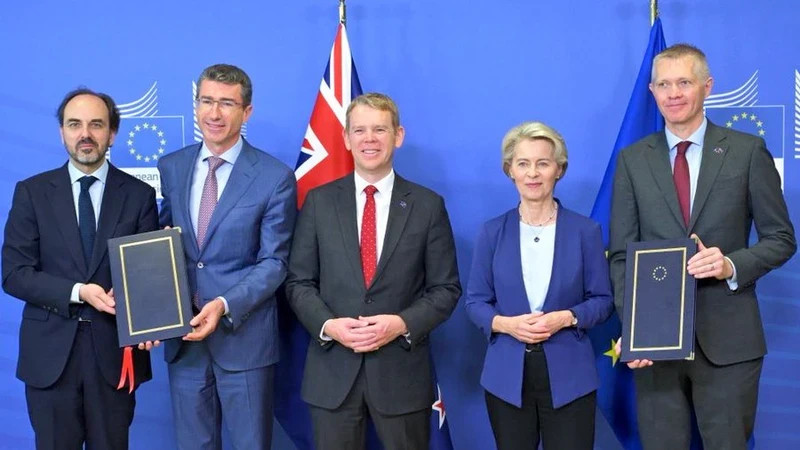To expand its economic cooperation network, in recent years, the EU has promoted the signing of trade agreements with many countries across continents in the world.
In 2023, the EU restarted FTA negotiations with Thailand, a dynamic economy in Southeast Asia. The two sides plan to hold the second round of negotiations at the end of January 2024, with the goal of finalising agreements by 2025.
Meanwhile, at the end of November, the European Council also approved an FTA with New Zealand and announced that this agreement would come into force once Wellington ratified it in early 2024.
The European Commission (EC) emphasised that this agreement strengthens the EU's engagement in the strategically and economically important Indo-Pacific region.
Besides the Indo-Pacific, Africa is a priority region in the EU's economic diplomacy. One of the historic agreements that the EU signed recently is the Economic Partnership Agreement with Kenya. This is the first broad trade deal between the EU and an African nation since 2016, creating momentum for the EU to penetrate deeper into the rich potential market in Africa.
In addition, a Sustainable Investment Facilitation Agreement (SIFA) was also recently signed between the EU and Angola, creating a breakthrough for economic cooperation between the two sides. The EC affirms that Kenya and Angola are two important partners in Africa.
The recently signed agreements promote economic cooperation between the EU and other countries and help to tighten the sustainable trade connection between the EU and Africa.
In addition to strengthening the EU's voice and position, these trade agreements also open up many economic cooperation opportunities, bringing significant benefits to the EU economy.
Thailand is the EU's 26th largest trading partner worldwide. The sides’ two-way trade hit 35 billion USD in the first ten months of this year, a rise of 1.96% year-on-year.
The EU expects that an ambitious, modern and balanced FTA with Thailand will pave the way for deeper trade ties with the second-largest economy in Southeast Asia.
Meanwhile, according to the EC, once the EU-New Zealand free trade agreement enters into force, bilateral trade is expected to grow by up to 30% thanks to this deal, with EU annual exports potentially growing by up to 4.5 billion EUR.
EU investment in New Zealand has the potential to grow by up to 80%. The deal can cut some 140 million EUR a year in duties for EU companies in the first year of application.
Analysts say that the EU's positive steps in promoting relations with partners occur in a context that the bloc's economy is facing many challenges, with high inflation, energy crisis and rising interest rates.
Recently, the European Central Bank (ECB) lowered its forecast for eurozone economic growth in 2023 to 0.6% from 0.8%. In that context, the newly signed trade agreements will bring about important cooperation opportunities for the EU.
















